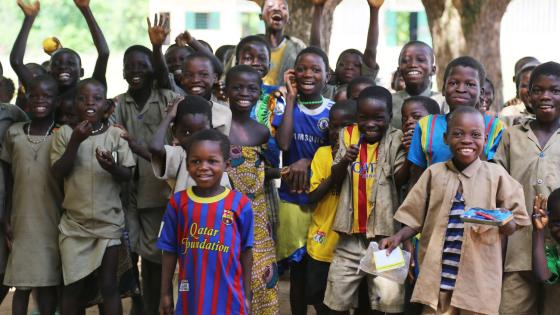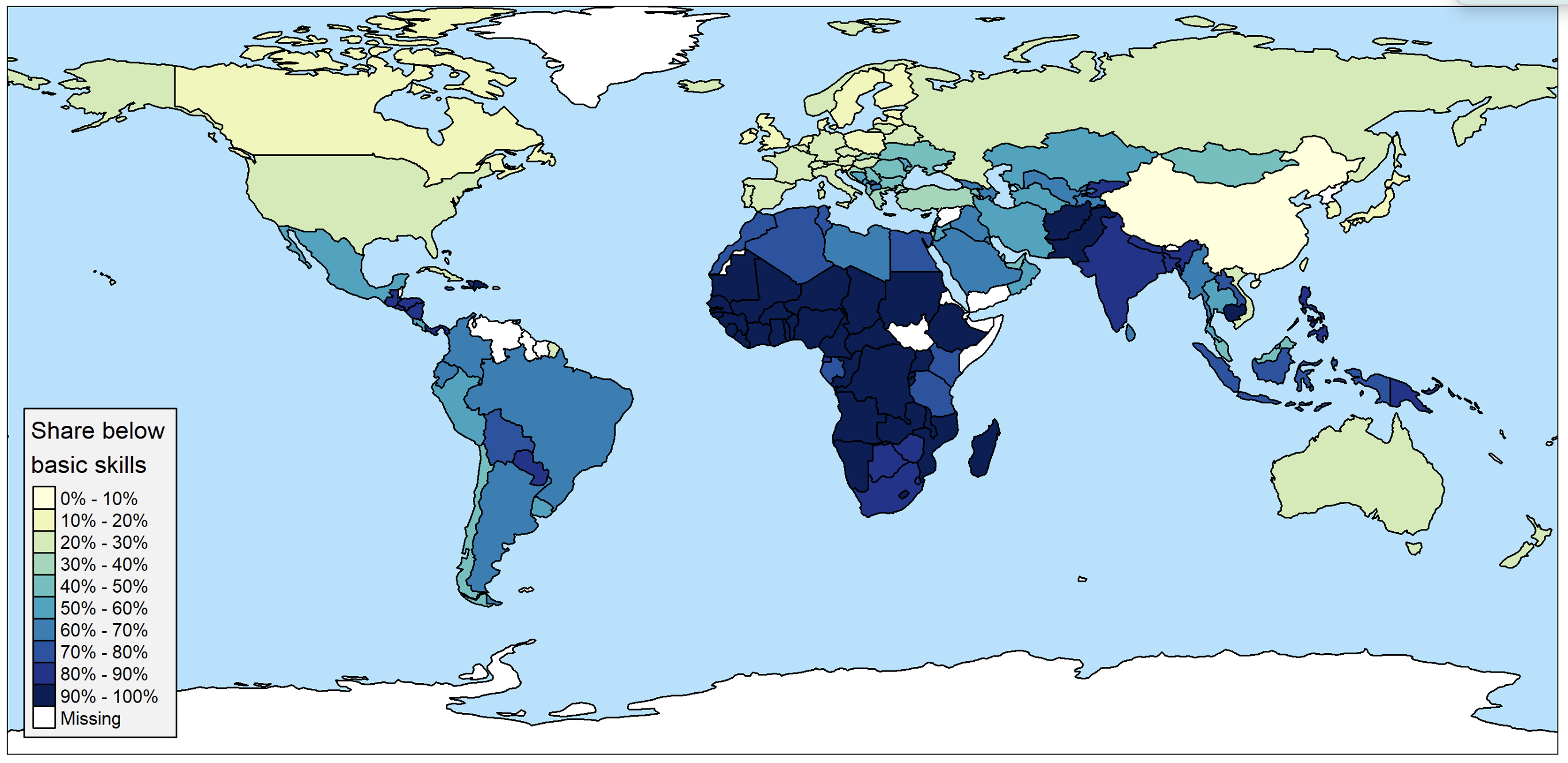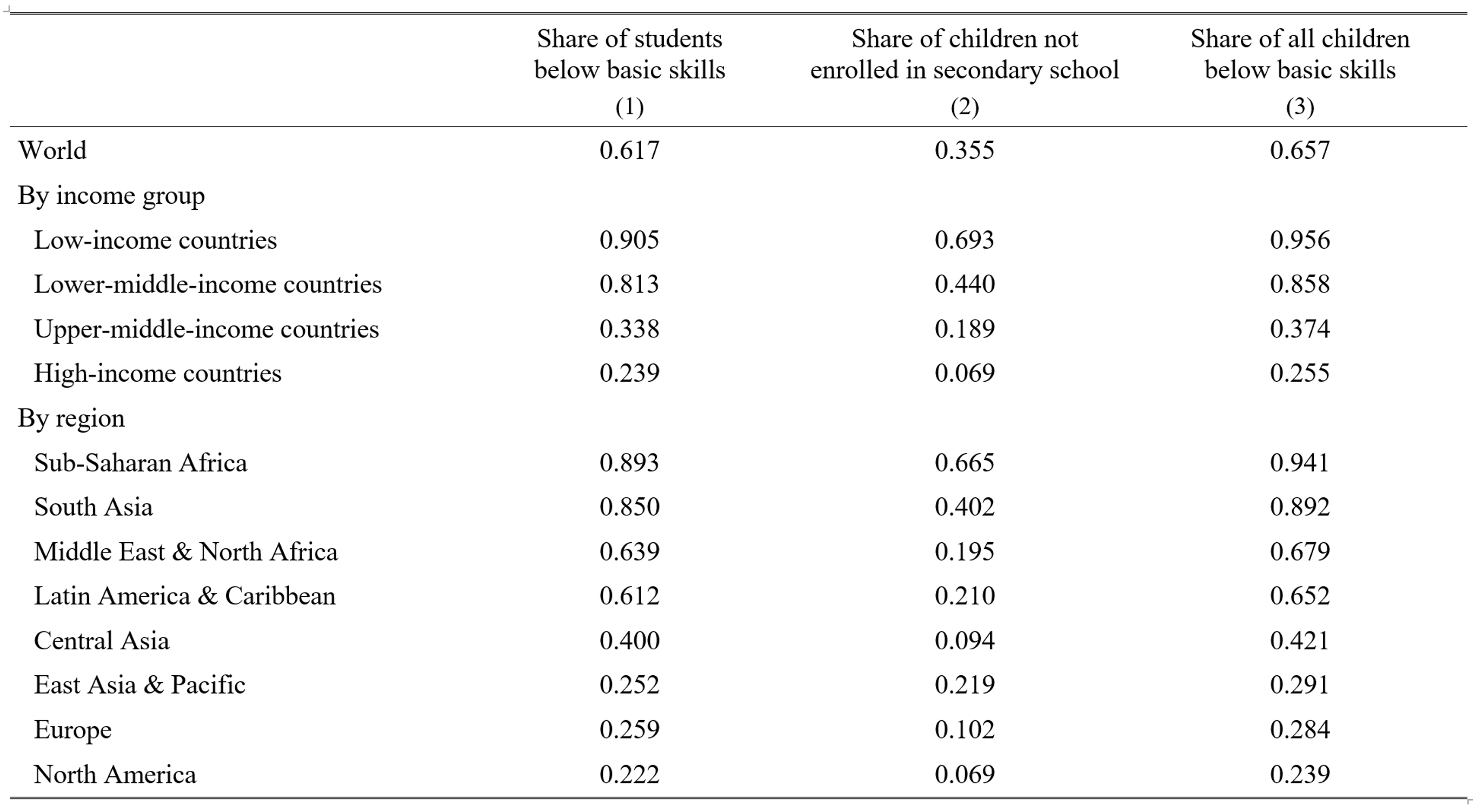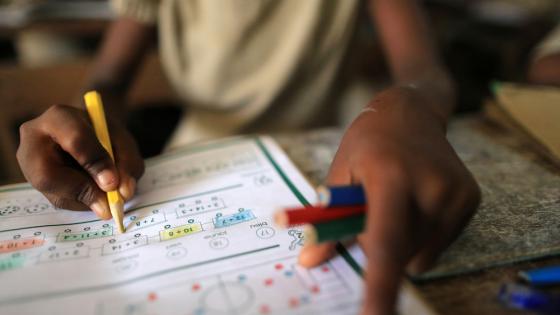While very low learning levels have been highlighted for selected low-income countries (e.g. Pritchett 2013, Pritchett and Viarengo 2021), the limited country coverage of international skill data means that it is unclear how many children currently fail to reach basic skill levels globally. The 17 separate Sustainable Development Goals (SDGs) (UNESCO 2021) emphasise a broad set of laudable development outcomes, ranging from eliminating poverty to conserving the oceans. But achieving the hope of these broad improvements is highly dependent on expanding resources to pay for and bring about change. On this score, past evidence suggests that upgrading the skills of each country’s population is the key to getting the necessary productivity improvements and economic growth (Hanushek and Woessmann 2009, 2016). We therefore focus on SDG 4 – ensuring equitable and inclusive quality education for all – which we believe is the key to developing the skills of a country’s workforce and thus to addressing the other SDGs.
Measuring skills on a global scale
In a new study (Gust et al. 2022), we address two intertwined questions: How close are we to reaching the foundational goal of basic skills for all? And what would it mean for world development to reach global universal basic skills? We draw on individual-level test data from available international and regional student assessments to develop world estimates of the share of children not achieving basic skills in each country and then show the economic costs of these deficits.
The universe of achievement information provides a detailed picture of how far the world is from creating basic skills for all children. We define basic skills as the skills needed to participate effectively in a modern international economy, which we measure by mastering at least the most basic skill level of the Programme for International Student Assessment (PISA) test, i.e. PISA Level 1 skills.
We first combine test information from the various international tests. PISA and PISA for Development (PISA-D) cover a total of 90 countries. Countries that have participated in the Trends in International Mathematics and Science Study (TIMSS) but not in PISA contribute 14 additional countries. Countries that have participated in regional achievement tests – TERCE and SERCE in Latin America and SACMEQ and PASEC in Sub-Saharan Africa – add an additional 20 countries. Two countries have also participated in PISA on a sub-national basis: India and China. These 126 countries with direct assessments of students represent 84.8% of the world population and 95.7% of world GDP.
A central element of our analysis is the development of a method for reliably combining the available assessment information to place the countries of the world on a common achievement scale. Even though the different tests were not designed with that objective in mind, we show that it is possible to transform student-level achievement on all tests into a PISA-equivalent score while introducing minimal constraints on the underlying score distributions. Our method equates the scales of the different tests by using the student-level distributional information found in the group of countries that participate in each pair of test regimes.
Estimating achievement of basic skills in countries without representative participation in the international tests adds an additional level of complexity. For the two countries with no international assessments except for PISA in selected provinces or states – India and China – we use additional within-country achievement information to provide estimates of national achievement on the PISA scale. For countries that never participated in any of the international tests, we impute achievement using cross-country regressions of achievement on educational enrollment, GDP, and indicators of world regions and income groups. Finally, the international tests provide data on children in school, but over a third of the world’s children are out of secondary schools, and their skills are not measured. We use information from PISA-D and from the Programme for the International Assessment of Adult Competencies (PIAAC) to estimate the skill levels of children who are not in school (relative to children in school in the specific country).
Using these varied approaches, we can estimate achievement deficits in 159 countries with a population of at least one million or a GDP that is at least 0.01% of world GDP. These 159 countries cover 98.1% of the world population and 99.4% of world GDP.
Six stylised facts on the world distribution of basic skills
Our results suggest that the world has a long way to go to reach global universal basic skills. The map in Figure 1 shows visually how the skills of countries vary.
Figure 1 World map of lack of basic skills: Share of children who do not reach basic skill levels
Notes: Estimated share of children (incl. those currently out of school) who do not reach at least basic skill levels in math and science (equivalent to PISA Level 1).
Source: Gust et al. (2022).
The world distribution of basic skills can be summarised by six stylised facts:
- At least two thirds of the world’s youth do not obtain basic skills.
- The share of children not reaching basic skills exceeds half in 101 countries and rises above 90% in 36 of these countries.
- Even in high-income countries, a quarter of children lack basic skills.
- Skill deficits reach 94% in Sub-Saharan Africa and 89% in South Asia but also hit 68% in Middle East and North Africa and 65% in Latin America.
- While skill gaps are most apparent for the third of global youth not attending secondary school, fully 62% of the world’s secondary-school students fail to reach basic skills.
- Half of the world’s youth live in the 35 countries that fail to participate in international tests and thus lack regular and reliable foundational performance information.
Table 1 provides the numbers for all country income groups and world regions. The results indicate that the lack of quality education in schools bears much more heavily for the overall lack of skills than incomplete school enrollment.
Table 1 Basic skill deficits on a global scale
Notes: Column 1: Estimated share of current students who do not reach at least basic skill levels in math and science (equivalent to PISA Level 1). Column 2: One minus net secondary enrollment rate. Column 3: Estimated share of children (incl. those currently out of school) who do not reach at least basic skill levels in math and science.
Source: Gust et al. (2022).
What missing skills mean for world development
We use our skill measures to quantify the economic gains that the world could reap from reaching the goal that every child achieves at least a basic skill level. Using estimates of the association between skills and long-run growth rates from existing empirical growth models with worker skills (Hanushek and Woessmann 2012), we project country by country the future path of GDP with improved skills.
The discounted 'added’ world GDP amounts to over $700 trillion compared to the ‘status quo’ GDP trajectory over the remaining century. This economic gain from reaching the goal of global universal basic skills is over five times the current annual world GDP, or 11.4% of the discounted future GDP over the same horizon. Put the other way around, this amount documents the lost economic output due to missing the goal of global universal basic skills. Importantly, the gain from lifting all students who are currently in school to at least basic skill levels turns out to be more than twice as large as the gain from enrolling the children currently not attending school in schools of current quality levels.
Our work extends the existing literature on global skill measurement (e.g. de la Fuente and Doménech 2022). Our method to combine achievement information from different international tests using the full underlying student distributions augments previous contributions such as Das and Zajonc (2010), Hanushek and Woessmann (2012), Patel and Sandefur (2020), and Angrist et al. (2021a, 2021b). Like Pritchett and Viarengo (2021) who focus on the extremely poor learning in a few developing countries, our results highlight the low level of learning outcomes of large shares of children in poor countries and extend the perspective by providing consistent estimates for the whole world. Following previous applications for OECD countries (Hanushek and Woessmann 2011, 2015, 2020) and US states (Hanushek et al. 2017a, 2017b), our projection model provides a global perspective to the literature on human capital and economic growth.
References
Angrist, N, S Djankov, P K Goldberg and H A Patrinos (2021b), “Measuring human capital: Learning matters more than schooling”, VoxEU.org, 9 April.
Angrist, N, S Djankov, P K Goldberg, H A Patrinos (2021b), "Measuring Human Capital Using Global Learning Data", Nature 592: 403-408.
Das, J and T Zajonc (2010), "India Shining and Bharat Drowning: Comparing Two Indian States to the Worldwide Distribution in Mathematics Achievement", Journal of Development Economics 92(2): 175-187.
de la Fuente, A and R Doménech (2022), "Cross-Country Data on Skills and the Quality of Schooling: A Selective Survey", Journal of Economic Surveys, forthcoming.
Gust, S, E A Hanushek and L Woessmann (2022), "Global Universal Basic Skills: Current Deficits and Implications for World Development", NBER Working Paper No. 30566.
Hanushek, E A, J Ruhose and L Woessmann (2017a), "Economic Gains from Educational Reform by US States", Journal of Human Capital 11(4): 447-486.
Hanushek, E A, J Ruhose and L Woessmann (2017b), "Knowledge Capital and Aggregate Income Differences: Development Accounting for U.S. States", American Economic Journal: Macroeconomics 9(4): 184-224.
Hanushek, E A and L Woessmann (2009), "Poor student learning explains the Latin American growth puzzle", VoxEU.org, 14 August.
Hanushek, E A and L Woessmann (2011), "How Much Do Educational Outcomes Matter in OECD Countries?", Economic Policy 26(67): 427-491.
Hanushek, E A and L Woessmann (2012), "Do Better Schools Lead to More Growth? Cognitive Skills, Economic Outcomes, and Causation", Journal of Economic Growth 17(4): 267-321.
Hanushek, E A and L Woessmann (2015), Universal Basic Skills: What Countries Stand to Gain, OECD.
Hanushek, E A and L Woessmann (2016), "Knowledge Capital, Growth, and the East Asian Miracle", Science 351(6271): 344-345.
Hanushek, E A and L Woessmann (2020), "A Quantitative Look at the Economic Impact of the European Union’s Educational Goals", Education Economics 28(3): 225-244.
Patel, D and J Sandefur (2020), "A Rosetta Stone for Human Capital", Center for Global Development Working Paper.
Pritchett, L (2013), The Rebirth of Education: Schooling Ain't Learning, Center for Global Development.
Pritchett, L and M Viarengo (2021), "Learning Outcomes in Developing Countries: Four Hard Lessons from PISA-D", University of Oxford RISE Working Paper.
UNESCO (2021), Global Education Monitoring Report 2021/2: Non-State Actors in Education - Who Chooses? Who Loses?, United Nations Educational, Scientific and Cultural Organization.







